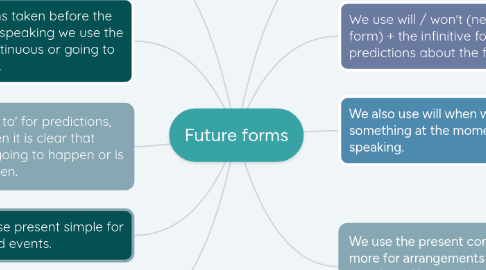Future forms
作者:Jacqueline Pérez Benítez

1. Yes, we also use: don't think, expect, be + sure.
2. For decisions taken before the moment of speaking we use the present continuous or going to (+ infinitive).
2.1. Amy’s coming round. What are you doing this evening?
3. We use 'going to' for predictions, especially when it is clear that something is going to happen or is about to happen.
4. We can use present simple for timetabled events.
4.1. Examples: My plane leaves at 4pm tomorrow. The match starts at 8pm.
5. Yes. You can use present simple for timetabled events.
5.1. Examples: My plane leaves at 4pm tomorrow. The match starts at 8pm
6. Will is one way of talking about the future, but there are others.
7. We use will / won't (negative form) + the infinitive for predictions about the future.
7.1. Examples: Oliver will be back soon. ✔ We won't be ready. Do you think it will rain this afternoon?
8. We also use will when we decide something at the moment of speaking.
8.1. Example: (The doorbell rings) I’ll get it.
9. We use the present continuous more for arrangements with other people and be + going to + infinitive for intentions.
9.1. Example: Amy’s coming round. (= arrangement between Amy and Daisy) Amy’s going to come round. (= Amy’s intention) I’m going to clean my room tonight. (= intention) I’m cleaning my room tonight. (not an arrangement)


